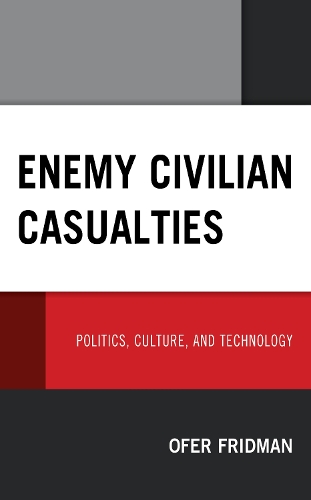
Enemy Civilian Casualties: Politics, Culture, and Technology
(Hardback)
Publishing Details
Enemy Civilian Casualties: Politics, Culture, and Technology
By (Author) Ofer Fridman
Bloomsbury Publishing PLC
Lexington Books
13th March 2019
United States
Classifications
Professional and Scholarly
Non Fiction
Warfare and defence
Politics and government
International relations
363.3498
Physical Properties
Hardback
256
Width 161mm, Height 229mm, Spine 25mm
562g
Description
Civil casualties and collateral damage have been long considered as an undesired outcome of military activity that has to be reduced. While most of the contemporary discourse on this topic has been primarily concentrating on three main factors: the legal aspects of causing civil casualties, the impact of war on local population, and different factors of military professionalism required to avoid disproportional harm to civilians; this book asks an entirely different question. As the subject of civil casualties during military operations seems to be highly politicized, this book takes this discourse out of its usual niches and suggests that the indirect responsibility rests with the politicians and the public, which they represent. When a society, in the beginning of the 21st century, sends its troops to a battle, does it really care about the enemy civilian casualties To answer this question, this book traces the political and cultural factors that have led to the failure of Non-Lethal Weapons the great promise of the 1990s, which was intended to make the war significantly less lethal than it was known before. Examining three different cases, this study explains that the idea of minimizing civil casualties is no more than an illusion, and, in fact, neither politicians, nor societies, feel really stressed to change this situation.
Reviews
Collateral damage in our military interventions especially the killing of children and defenseless adults could be massively reduced by using non-lethal weapons. A large variety of these exists, and yet our militaries do not like to use them, and there is little interest in the matter in countries supposedly so committed to upholding human rights. In this pioneering study, Dr Ofer Fridman identifies the causes of this in diverse military cultures and a to my mind shameful public disinterest in what happens to civilians elsewhere. A must-read for all practitioners and anybody willing to support military interventions. -- Beatrice Heuser, University of Glasgow
"Ofer Fridman provides a number of insights on the potential for non-lethal weapons to reduce civilian casualties in contemporary warfare, and fills in the complex history of the fate of such weapons in three key countries whose concern for civilians is controversial. These are important issues that specialists and the public alike should be discussing as our military technology continues its breathtaking transformation. -- John Tirman, executive director of the MIT Center for International Studies
Enemy Civilian Casualties sadly confirms through meticulous empirical study what many people had suspected: that governments and populations are not truly concerned with civilian casualties in the conflicts fought by their armies. Examining the experiences of the U.S., Russia, and Israel, the author convincingly demonstrates that neither new military technologies nor international political pressures have had more than a nominal impact on significantly reducing civilian deaths. The most important conclusion of this study is that the problem lies not with the military but with civilian political officials and the indifference of their societies. -- Bruce Cronin, The City College of New York
Author Bio
Ofer Fridman is lecturer in war studies and director of operations at the Kings Centre for Strategic Communications.
